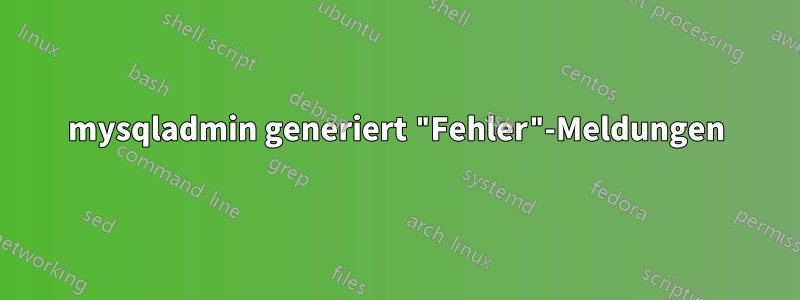
Vor einiger Zeit habe ich NGINX, php7, mariaDB und Wordpress auf meinem Raspberry Pi mit Raspbian installiert.
Ich habe eine Wordpress-Datenbank erstellt – die funktioniert.
Vor kurzem habe ich ssmtpes mailutilsauf meinem System installiert, um E-Mails zu versenden.
Jetzt bekomme ich täglich eine E-Mail mit folgendem Fehler
/etc/cron.daily/logrotate:
mysqladmin: connect to server at 'localhost' failed
error: 'Access denied for user 'root'@'localhost' (using password: NO)'
error: error running shared postrotate script for '/var/log/mysql/mysql.log /var/log/mysql/mysql-slow.log /var/log/mysql/mariadb-slow.log /var/log/mysql/error.log '
run-parts: /etc/cron.daily/logrotate exited with return code 1
Das ist ein wenig ärgerlich. Es gibt keine Datei/var/log/mysql/mysql.log
Der Root-Benutzer von MySQL hat ein Passwort.
Was kann ich tun, um die Fehlermeldungen zu unterdrücken?
BEARBEITEN
/etc/cron.daily/logrotateAnrufe/etc/logrotate.conf
was beinhaltet
# rotate log files weekly
weekly
…
# packages drop log rotation information into this directory
include /etc/logrotate.d
welches beinhaltet
/etc/logrotate.d/mysql-server
# - I put everything in one block and added sharedscripts, so that mysql gets
# flush-logs'd only once.
# Else the binary logs would automatically increase by n times every day.
# - The error log is obsolete, messages go to syslog now.
/var/log/mysql/mysql.log /var/log/mysql/mysql-slow.log /var/log/mysql/mariadb-slow.log /var/log/mysql/error.log {
daily
rotate 7
missingok
create 640 mysql adm
compress
sharedscripts
postrotate
test -x /usr/bin/mysqladmin || exit 0
if [ -f `my_print_defaults --mysqld | grep -m 1 -oP "pid-file=\K.+$"` ]; then
# If this fails, check debian.conf!
mysqladmin --defaults-file=/etc/mysql/debian.cnf --local flush-error-log \
flush-engine-log flush-general-log flush-slow-log
fi
endscript
}
/etc/mysql/debian.cnfenthält
# Automatically generated for Debian scripts. DO NOT TOUCH!
[client]
host = localhost
user = root
password =
socket = /var/run/mysqld/mysqld.sock
[mysql_upgrade]
host = localhost
user = root
password =
socket = /var/run/mysqld/mysqld.sock
basedir = /usr
Antwort1
Gehen Sie zu Ihrem MySQL/MariaDB-Client und stellen Sie sicher, dassdebian-sys-maintBenutzer mit leerem Passwort ist bereits vorhanden inBenutzerTabelleMySQLDatenbank
Der Standardwert
/etc/mysql/debian.cnfsollte enthaltendebian-sys-maintalsBenutzeranstattWurzel
# Automatically generated for Debian scripts. DO NOT TOUCH!
[client]
host = localhost
user = debian-sys-maint
password =
socket = /var/run/mysqld/mysqld.sock
[mysql_upgrade]
host = localhost
user = debian-sys-maint
password =
socket = /var/run/mysqld/mysqld.sock
basedir = /usr


